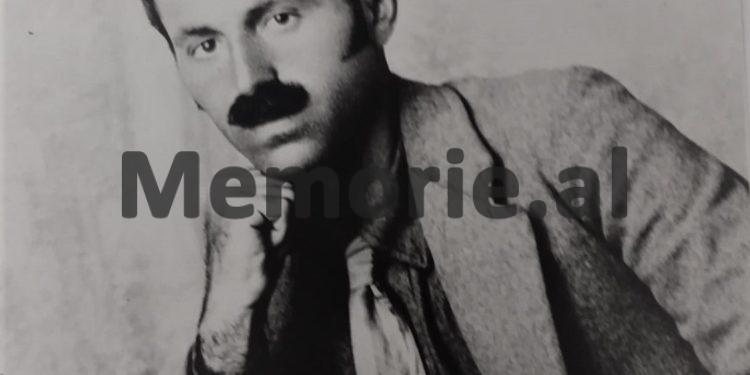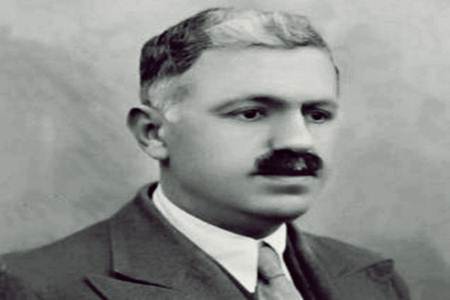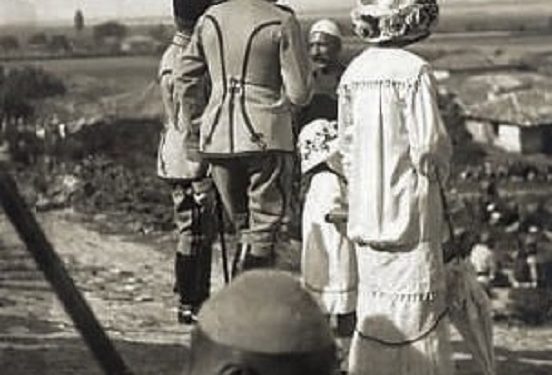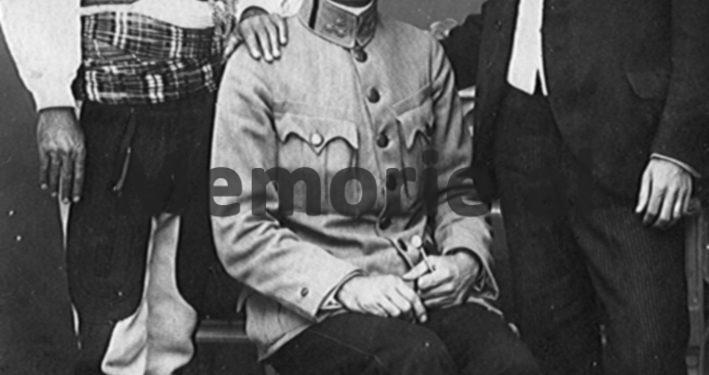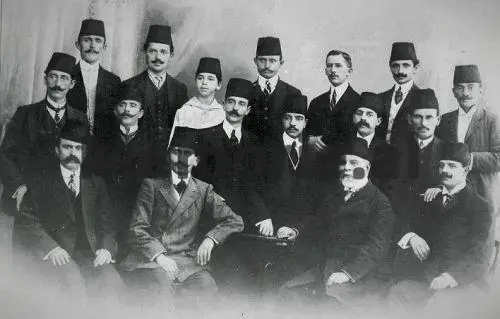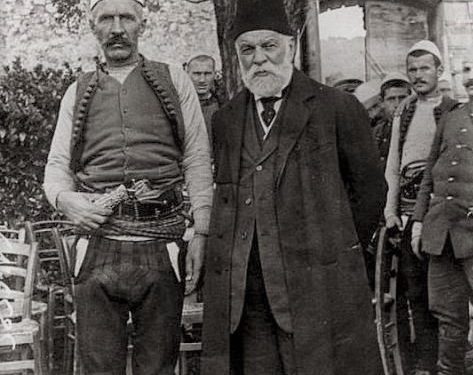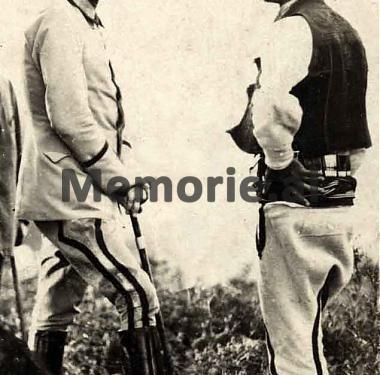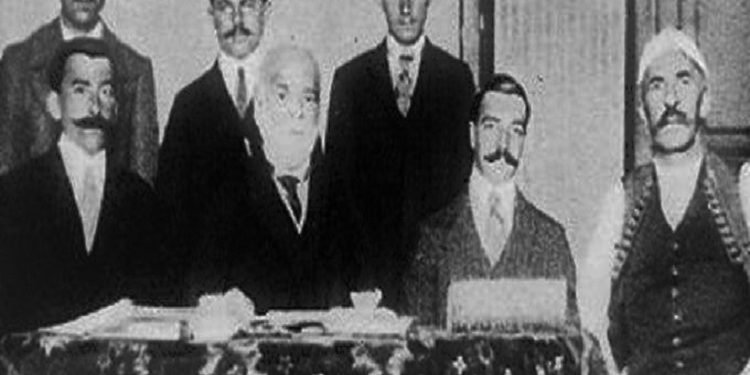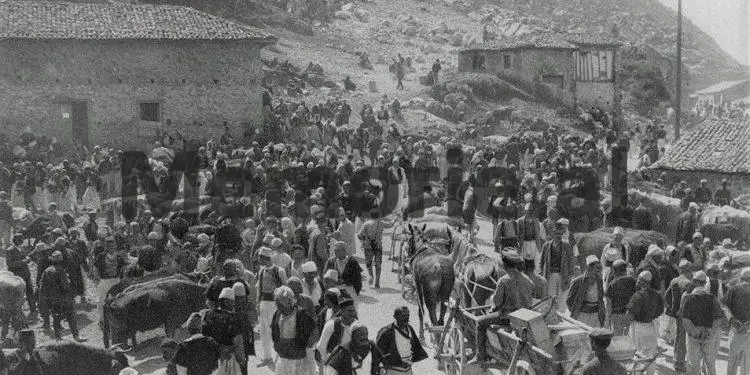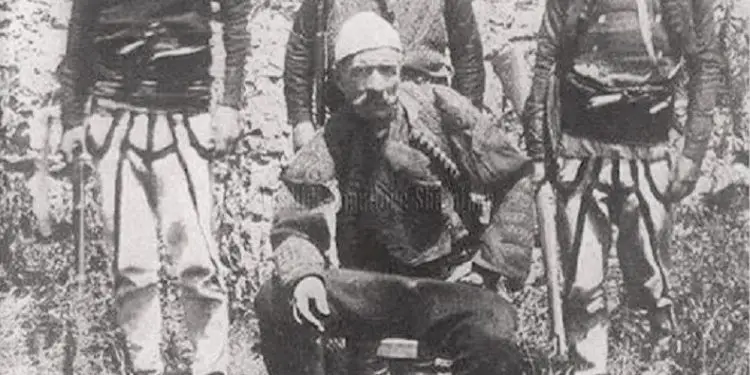By Hamid Gjylbegaj
The first part
Biographical memories of Hamid Gjylbegaj
– HISTORICAL EVIDENCE 1912 – 1925 –
Memorie.al / I were born in Shkodër on March 1, 1888. I received my first lessons in my hometown, in the Turkish, Mejtepe and military schools. I finished the last year of the military college in Bitola, from where I went to the Military Academy of Turkey, in Istanbul. After finishing school, I was appointed a lieutenant in the Fifth Corps of the XIII Division of the 38th regiment of Thessaloniki, where I served until October 1912. During this time I fought in Kumanovo, Prelep, Bitola (where I was wounded twice ) and finally in the Castle of Ioannina, in Bizhan, until February 28, 1913. For military actions during the war, as a distinguished officer, I was prematurely promoted to the rank of lieutenant. I entered the military history of the Balkan War as the first officer in the world to discover, on the basis of ballistics science, that the German 7.50 mm field automatic cannons, compared to the French 7.50 mm. were inferior. It was a technical mistake by the Germans, who made the cannon barrels 25 cm. shorter than the French cannons, which later, in the First World War, was also discovered by the Chief of Staff, General Ludendorff. My report on this matter is in the military archives of Turkey. With the surrender of the Ioannina Castle on March 6, 1913, the entire Turkish high command, of which I was also a part, was taken prisoner of war. As a prisoner of war, I spent seven and a half months on the island of Zanta (Zaqinthon). With the signing of the Peace Treaty, in October 1913, I moved to Istanbul.
Captivity on the island of Zante
During my time as a prisoner of war on the Island of Zante, I was able to establish contact with the English consul of that country. Gaining his sympathy as a nationalist, I asked him for a visa to return to my country, Albania. He advised me not to make the passport, since the Greeks, as treacherous as they were, imprisoned all those who had fought against them. The consul recommended me to do this work when I returned to Turkey, to the consul there. I obeyed his advice.
In conversations with the consul, I expressed my suspicion that Italy and Austria were dividing Albania between them. His answer was that even if England lost the war (foreshadowing the First World War), it would never allow Albania to be divided between Italy and Austria. His advice for us Albanians was to follow an extreme nationalist line.
The Greek captain, the commander of the island of Zante, who also had in hand the supply of prisoners of war, whose number was 1,250, began to abuse. Indignant at this indignity, through the English consul, I notified the Turkish general command at Athens, (they were also prisoners of war) who intervened with the King of Greece, Constantine I.
The latter sent a Greek inspection commission that confirmed the abuse and the commander of Zante was sentenced to 12 years in prison. For this reason, a control officer, who belonged to Venizelos’s party, intervened and transferred me to the Castle of More, Naflion Palamiothi, where there were also sixteen other officers, who had been isolated for political reasons.
Among them was the major of Korparmata, Stroma, Ali Ahgja Begu from Serezi of Thessaloniki. In the castle of More, among the officers, on the initiative of Ali Ahgja Beg, we had political conversations to analyze the causes of the loss of the war in Rumeli. One night, as I was ill, I was excused from attending the meeting. The commander, remembering that I was sleeping, said to his friends:
“Don’t you feel sorry for this young man, who has made all these sacrifices in Kumanovo and Ioannina, who entered the military history of the Balkan war, and after leaving his country, I don’t know what pulls him to come to Turkey. To say religion, it has lost its importance, because in the world now is the period of nationalism”.
THE RETURN FROM CAPTIVITY IN ISTANBUL – THE ACTIVITY AND FAILURE OF THE SECRET COMMISSION – THE OVERTHROW OF ISMAIL QEMAL’S GOVERNMENT
For me, returning to Istanbul was very difficult, because the general command received me with great respect and thought of giving me a job with responsibility. However, my goals were different. I wanted to go back to my country. The Turkish command gave us distinguished officers a year’s leave.
Some time ago, a secret political committee was formed by the Turkish state. Later, as Albanians, I and Beqir Grebenea, from the district of Ioannina, participated in it. The Ministry of War appointed me as chairman of the Committee for North Albania, and Beqir Grebena, as chairman for South Albania.
This committee was tolerated by England, Germany, Austria and Italy. His goal was the enlargement of the borders of Albania, the autonomy of Macedonia, the annexation of western Thrace by Turkey, and the appointment of a Muslim prince in Albania. Bulgaria had also joined this political line.
But after Enver Pasha killed Nazim Pasha, the Minister of War of Turkey at that time and took state power, he joined Germany. 43 senior German officers headed by General Otto Liman von Sander came to Turkey. This was the reason that England and Italy separated from the aforementioned political line, and Russia protested this political position.
The English did not hand over the battleship “Reshadie” that the Turks had ordered to England. France, of the 20 million gold francs it had promised Turkey, gave only 5 million. All this happened because Turkey as a state did not maintain neutrality and disrupted the political balance of Europe.
Ismail Qemali, as the head of the Albanian state, also known by Turkey, entered into relations with Turkey for the implementation of the four points of the aforementioned committee. As an agreement between the two states, 35 Albanian officers from different parts of Albania, led by Beqir Grebenaja, were allowed to come to Albania as volunteers.
But on January 7, 1914, the International Control Commission located in Albania arrested these officers, as they were with the line of the secret Committee, a line which, later, was not tolerated by all states, as it had broken the neutrality of the state Albanian, because of which Ismail Qemali was overthrown by the government of the Albanian state on January 22, 1914 and was forced to go into exile on January 24, 1914.
Thus all the work of the secret committee failed. The International Control Commission took the direction of the Albanian state. To maintain the balance in the Balkans, the German prince Wied, who would now be our King, was appointed by the great powers to head the Albanian state. After the political activity of the committee failed, on March 7, 1914, with the arrival of Vidi in Albania, I resigned as an officer of the Turkish state.
Before returning to Albania, on the occasion of Wied’s arrival in Durrës, I gathered the Shkodra Albanian officers who were in Turkey and explained to them the bankruptcy of the political line that Turkey wanted to follow with the help of the secret committee. My advice to them was to split into different military technical branches, so that later they would return to serve in free Albania.
RETURN TO ALBANIA – At the service of Wiedi
I came to Albania voluntarily on March 17, 1914. When I landed in Vlora, where I was received with honors by fellow Albanian officers, I presented myself to the Dutch colonel Thomson, who was later martyred in Durrës.
Colonel Thomson immediately appointed me as an assistant to the Dutch Major Kroon, who would lead the gendarmerie of the north, for the establishment of the gendarmerie in the city of Shkodra. Kroon replaced Colonel Thomson after the assassination.
After May 19, 1914, the conflict between Esat saw Toptan and Wiedi took place in Durrës and the revolution of the rebels of Central Albania, Major Kroon, went to Lezhë. There he urgently called me to organize and transport to Durrës the morning volunteers of Preng Pasha, who were going to help Wiedi. After the telegram I received from Major Kroon, I quickly went to Lezhë.
Here the Crown Prince of Romania, Stourdza, the French Count, De Pimodani, and an Englishman with a monocle, who had also taken with him cannon of small caliber, had come to help Wiedi. As I had not brought any clothes with me, Prince Stourdoza gave me a mattress and we arranged to sleep in one room. A company of 150 Romanian volunteers had also come to the aid of the king in Durrës, under the command of Captain Kristescu.
At this time, together with Fadil Bej Toptani and Jonuz Tafaj, we left for Krujë to meet with Ahmet Zogu, for the coordination of the volunteers of Mati and Mirdita, to come to the aid of the government of Wied. In addition to Mati’s forces that were gathered in Krujë, and Mirdita’s forces gathered in Lezhë, the Catholic part of the city of Shkodra, with the band of music, had come to help. Volunteers had also come from all the towns of Zadrima, led by the bishop of Kallmet, Monsignor Bumçi.
It is worth noting that the Catholic forces of Zadrima gathered in Lezhë, as against the answers of the rebels of Central Albania who had put the star and the moon on the flag, they had put the cross on the spear of the flag. As an officer and Albanian nationalist of the Government of Durrës, as soon as I saw this act, on my own initiative I changed the shape of the cross, making it straight like a spear. I did this action in order not to give the war the character of a crusade. With the Catholic forces of the city of Shkodra, non-Catholics, there were only me and Dan Hasani.
The forces of Malësi Madhe, pushed by a foreign hand, fell on Ishmi the night we were in Kruja and burned and robbed it. When they saw that Ishmi was burned, the rebel forces made a counterattack and defeated the volunteer forces of the city of Shkodra and Preng Pasha, in Gajush on the Mata Coast. So even Ahmet Zogu could not do anything. I want to emphasize that both Preng Pasha and Ahmet Zogu had received a certain amount of money from the Government of Durrës.
While we were in Kruja, we received a telegram written in Turkish by the Mufti of Tirana, Hafiz Musa Qazimi, addressed to Ahmet Zog. The text of the telegram, more or less translated into Albanian, was: “To the commander of the assembled forces Ahmet Begut, Krujë. The persons with harmful letters who have come there in the name of Islamism, please arrest them and send them to Shijak prison. Afiz Musa Qazimi”.
From Kruja, accompanied by Ahmet Zog’s forces, we came to Lezhë via the mountain road, where I met with Preng Pasha. He proposed to me that we go to Shkodër and talk to the commander of the troops of the international powers, to stop the passage of the highlands of the Great Highlands, from the Drini Bridge. But it was too late. The act was done. They made the crossing from Vau i Drini, without having to go through Shkodër.
Service in Vlora and Durrës
I continued on my way to Shengji, to return to my duty in Durrës. As soon as I arrived, the Dutch major, Kroon, ordered me to accompany a German, a member of the Kaiser’s family, whose name I do not remember. The goal was to go to Vlora, to see the Albanian refugees who had fled their countries followed by the Greek troops. The person I accompanied took the necessary notes and took some photographs to prove the fact of the Greek reprisals against the Albanian population. After completing this work, we returned to Durrës.
With my own will, as soon as I arrived in Durrës, I took the task of protecting the Dajlani Bridge from the rebel forces, as a stable officer. I performed this duty until the day Wiedi left Albania, on September 3, 1914. At the time I was a volunteer officer in the defense of the Dajlani Bridge, I wrote the first political poem “Gjama e Xqypes”. This poem was printed for the first time in Nikol Ivanaj’s “Lidhja Kombatare” Notebook, which was published in Shkodër, and later in my book, “Butterfly among Flowers”.
With the collapse of the Government of Durrës, together with Çerçiz Topulli we came to Shengjin, and from there to Shkodër.
Glass of Albania
Albania, my dear,
It remains like a bubble on the water,
A’kah is taken through the legs,
The tool is everywhere.
No fault of the black star,
But they have her sons;
Propaganda has turned it on,
They made him cry.
I previously for Italy,
You know me about Turkey,
This is the sail with the departure,
They are cheering for Austria.
Albanians, you have no nationality,
Kjenke lower meaning,
For a little bit of money, I’ll do the trick,
I lose track of the whole place.
When the man doesn’t want the place,
It’s not about nationality,
Drown in the water let them die,
That’s how you submit them to me in general.
Today the homeland is complaining,
Through the child he raised at the breast,
He is cursing them all,
Who sell the soul for gold.
History never forgets,
I write your wickedness,
He calls the children to cry now,
The character is over.
O Albanians, ancient and old,
Ari kjeka your God1
For nothing else,
But now it’s up to you.
(Newspaper “Lidhja Kombëtare” Shkodër, e Han, May 31, 1915).
Political activity in the city of Shkodra in 1915
At this time, various political clubs were formed in the city of Shkodra, such as: “Shoqnia Bogdani”, “Shoqnia Mustafa Pasha”, “Agimi”, “Zgjimi” and “Lidhja Kombatare” of Nikol Ivanaj, in which I was a member. Shkodra had become the only center where all the Albanian nationalists had gathered.
In the northern mountains with sixteen Albanian officers and Sulo Çela
Since the international situation was complicated, we saw fit to go to the Northern Mountains to join the forces of Bajram Curri, at the house of Sadik Dida in Has of Gjakova. There we found that Austria had secretly taken some officers, weapons, ammunition and clothes. All these were carried out by the Catholic Clergy from Bregu i Mata.
In Has t Gjakova, the Montenegrin forces in cooperation with Ceno Beg Kryeziu, early in the morning, on the day of Eid, teach us with a battalion of soldiers, a mountain battery and a company of machine guns. Not having the strength to fight, we were forced to retreat. We passed the Vezir Bridge, and came out to the north of Black Mountain of Puka. Here we parted with Bajram Currin, to whom we gave some help
that we had, and he from Vau i Fierza went to the Highlands of Gjakova. While we continued our journey to Shkodër.
When we arrived in Vaun e Dejes, we found out that Shkodra was divided into two, fighting against each other, Catholics and Muslims. Esat Pasha’s forces threatened Lezha and Mirdita. Thus, there was no place left for us. Then in Vau e Deja where we were, Sulo Çela, an old Albanian, got on a table and described the difficult situation with these words: “Here Christians and Muslims fight, Montenegro fell to us there, over there Esati threatens Lezha of Mirdita, for us true Albanians, there is no place left in the mess of the earth”. And at this moment, he raised a toast saying: “Long live the dead”.
Seeing this difficult situation, we discussed among ourselves how to act. We decided that we would all enter Shkodër. However, the fratricide in the city continued, Shkodra was divided into two parts. On one side Alush Lohja brigadier of Montenegro, with some Shkodra Muslims who had occupied both the Baçallek Bridge and the Buna Bridge, and on the other hand, Shuk Serreqi, brigadier of Austria, with a Catholic part.
For me as Hamid, it was a dilemma to enter Shkodër with my friends, for the reason that Alush Lohje’s party could reach out and arrest me, but my family and personal dignity did not accept this, so I left from my friends and I entered Shkodër from the Catholic side, while my friends came from Ura e Bahçallek. Among the Shkodra officers, there was Taip Shkodra, whom Alush Lohje’s party caught and arrested. Meanwhile, I stopped at Preng Pasha’s house, who gave me four of his volunteers, who accompanied me to my house.
Upon arrival in Shkodër, I went to Preng Pasha again and we managed to unite the two parties, Catholic and Muslim, and freed Taip Shkodër from arrest.
The entrance of Montenegro to Shkodër
From the abnormal situation that existed, which I described above, on July 15, 1915, Mali i Zi managed to enter Shkodër.
Together with Çerçiz Topulli we talked about the issues of the country. Çerçizi proposed that we go out into the mountains. However, knowing the situation well, I opposed it. Without forces, it was impossible to stay in the mountains, because the national idea was not developed in our mountains and foreign propaganda did its work.
So they would wait for us in faith. This was proven with Isa Boletini, who, although he had the strength to stay among the mountains, agreed with the mediation of the French consulate in Shkodër, to go into exile in Montenegro, provided he remained armed. And there happened what is known historically. He was treacherously killed with all his friends by the Montenegrins. This happened, in our mountains, later also to Ded Gjon Luli. He went to Mirdita to take refuge and was ambushed and killed by the Serbs.
Before the entry of Montenegro into Shkodër, in that abnormal state that it was, Austria took the initiative through the Austrian Consulate in Shkodër, to ask for help from Albanian officers from Albania and Turkey to fall to Serbia and Montenegro.
The officers in Shkodër, who were in a tighter economic position, went to Austria and waged war against Montenegro and Serbia.
The day that Montenegro entered Shkodër, because it had the information network in the city, it gathered all the Albanian officers, and some of them were exiled to Montenegro.
On this occasion, Alush Kastratin and I from Peja were separated on one side, Çerçiz Topulli and Mustafa Qulli on the other side. Çerçiz and Mustafa were kept under arrest in Shkodra prison, and the next day at dinner on July 17, they were executed. Captain Alush Kastratin and I were asked for guarantees that we would not get involved in politics and stay locked in our homes, waiting for the decision that King Nicholas would make for us.
This differentiation happened because Montenegro called Peja and Shkodra annexed countries and considered us citizens of Montenegro. (Prepared by Dr. Shefqet Deliallisi). Memorie.al




